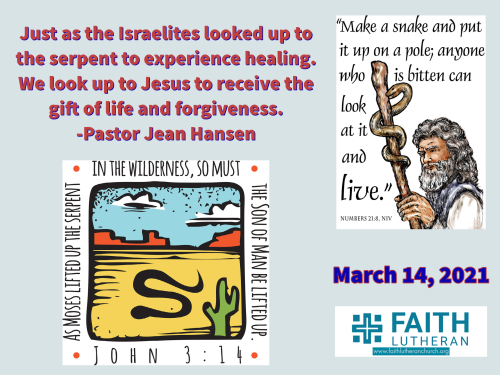
God’s Remedy: Snake on a Pole, Jesus on a Cross
Mar 14, 2021
Sermon 3-14-2021
Fourth Sunday in Lent
Text: Numbers 21:4-9, John 3:14-21
Pastor Jean M. Hansen
In her book, “Everything Happens for a Reason, and Other Lies I’ve Loved,” which Duke Divinity School Professor Katie Bowler wrote after, at age 36, being diagnosed with stage 4 colon cancer. She writes about going to Texas to hear an inspirational speaker during Lent. Pastor Elizabeth Lovell Milford, who tells this story, noted that Katie seemed to have it all – a thriving career, married to her high school sweetheart, a newborn son – before the jarring diagnosis. So, Katie goes to hear the speaker even as she is wrestling with her own mortality, and what does the speaker do?
I’ll quote Pastor Milford: (The speaker) “confessed that she did not like to deal with the heavy stuff and was afraid of death and would rather not talk about it either. Katie, upset by this, said to a friend, ‘Everyone is trying to Easter the crap out of my Lent.’” (1)
Katie needed to acknowledge her pain before celebrating any of the Good News, both of which are not so easy things to do as we live imperfect lives in an imperfect world. In today’s Old Testament lesson, the people of Israel acknowledge their pain, but not in a particularly productive way.
First, though, let’s remind ourselves that the Old Testament readings this Lent have been about the relationship between God and people, focusing on the theme of covenant. We have remembered God’s covenant (or promise of relationship) with Noah and all creation, with Abraham and Sarah and their descendants, and with Israel on Mt. Sinai, which included the giving of the 10 Commandments.
In today’s account, that last covenant is on shaky ground. As commentator Stan Mast notes, after God confirmed the covenant with the people at Mt. Sinai, they responded not with faith, gratitude, and obedience but with unbelief, ingratitude, and rebellion. Their behavior led to decades of wandering in the wilderness since God had decreed that none of those rebellious people would inherit the Promised Land; it would be God’s gift for their descendants.
Just before the events described in today’s text, they have been forced to take yet another detour on their seemingly endless journey. It has been nearly 40 years, after all. Not surprisingly, they snap! They had had enough.
They cry out, not only against Moses but against God as well. “Why have you brought us up out of Egypt to die in this wilderness? For there is no food and no water, and we detest this miserable food!” (Numbers 21:5) Well…no water except that which God provides, and no food except the manna that God also gives them, which they call miserable. Now…before you label these people as spoiled brats, think about eating what tastes like cakes baked with oil day and night, which is how manna is described elsewhere in scripture, with a quail thrown in now and then for protein. Who could help but long for the fish, cucumbers, melons, leeks, garlic, and even wine left behind? It has, after all, been 40 years of wandering without much progress, which has caused them to forget the brutality of slavery in Egypt.
Still…they have ignored God’s covenant with them, which causes God to snap too. Their lack of trust and gratitude is too much since God’s grace is the only reason they are free and alive. As Stan Mast says, “In no uncertain terms, Israel is rejecting the grace of God in all its forms – his great redemptive acts on their behalf and his daily provision for their lives. Anything and everything God had done for them in his gracious love is spurned by an impatient, unbelieving, ungrateful and rebellious people.” (2)
The consequence is snakes, poisonous snakes, poisonous snakes that bite. Really??? I will admit, it’s somewhat difficult for me to imagine the gracious God I serve being pushed that far. How do you feel about snakes? I cannot say I like them, but I am not afraid to look at them as long as they are behind glass or being held by someone else. A few weeks ago, I enjoyed a wonderful trip to the Toledo Zoo with friends; the building in which the orchid show was housed, which is why we went, also had the reptiles and insects.
I wanted to check out the diamondback rattlesnakes since twice in my life I’ve had to step around them while hiking, so I have an odd sort of affinity for them. But, my friend, Julie, who some of you have met, would not even go into the room; she does not “do snakes.” She’s in good company and can claim Biblical precedent, including today’s story. There is no beating around the bush about it: God sent the snakes, they bit the people, and many of them died. There’s not much grace-filled about that.
Let’s just say that got their attention, and they quickly saw the error of their ways, repented, and asked Moses to ask God to take away the serpents, which Moses does. But God doesn’t … doesn’t get rid of the snakes. Instead, God provides a remedy. “Make a poisonous snake (of bronze), place it on a pole; and everyone who is bitten shall look at it and live.”
WHY?? It hardly seems fair that they still have to deal with the snakes, does it? (We probably think that about the challenges we face: why, if God loves us, we ask.) Yet, there’s healing; there’s hope IF they look in the right direction. In fact, God provides healing where the sting is the worst. I’ll quote Stan Mast one last time: “They had turned away from God who had saved them in multiple ways. They needed to turn toward that God again and look at his saving work.” (3)
It is interesting that in the end, in spite of the Israelites’ complaining, doubts, lack of trust, flagging gratitude, and having suffered the consequences of all that, the solution is to turn to God. Commentator Elizabeth Webb writes that this passage tells us a lot about God. “Even in our worst failures and disappointments, God provides. God offers healing for our wounds, a relationship for our loneliness, and faithfulness for our faithlessness. God does not remove the sources of our suffering, but God makes the journey with us, providing what we most deeply need, if we but look in the right direction.” (4)
We read this Old Testament story every three years in Lent because it is mentioned by Jesus in the Gospel lesson from John, including the well-known John 3:16. Jesus said, “Just as Moses lifted up the serpent in the wilderness, so must the Son of Man be lifted up, that whoever believes in him my have eternal life.” And then, “For God so loved the world that he gave his only Son, so that everyone who believes in him may not perish but may have eternal life.”
Just as the Israelites looked up to the serpent to experience healing. We look up to Jesus to receive the gift of life and forgiveness. A Florentine artist named Giovanni Fantoni, who created a mental sculpture, now in Jordan, represents the pole intertwined with a serpent. The artist intentionally crafted the design to connect with the reference in John’s Gospel. The upper arms of the staff extend horizontally, almost like a cross. (5)
In Lent, we focus on the cross; it is essential to do so before celebrating the Good News on Easter, or we will not grasp the breadth and depth of our rejoicing. The cross proclaims God’s presence with us – with the world – as we suffer. Lift up your eyes, see Jesus, see hope, healing, and yes, grace, even in the midst of life’s snakes. AMEN
(1) “Snakes in the Wilderness” by Elizabeth Lovell Milford, March 11, 2018, Numbers 21:4-9; John 3:14-21, www.heritagepres.com
(2) “Lent 4B: Numbers 21:3-9” by Stan Mast, www.cep.calvinseminary.edu
(3) Same as #2
(4) Same as #1
(5) Same as #1






